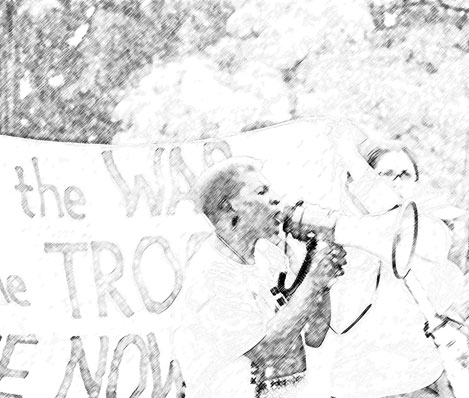
Anti - War Movement Stands Firm • Buffalo Says No to John McSame! End Wars Against Iraq and Afghanistan Now! •Anti War Song
Hands Off Iran
• July Actions Demand No War on Iran
• Iran Isolation Attempts Backfire• Playing Games with Iran
Youth, Women, Workers, Seniors
Buffalo Says No to John McSame!
End Wars Against Iraq and Afghanistan Now!
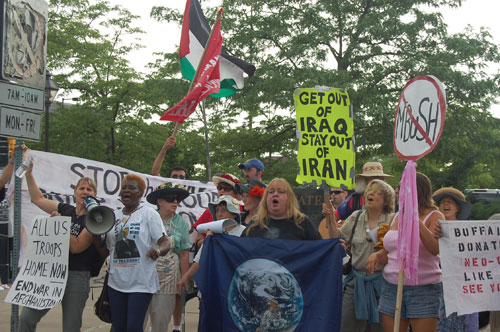
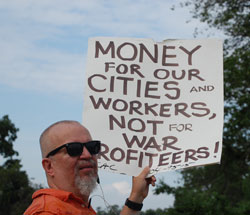
![]()
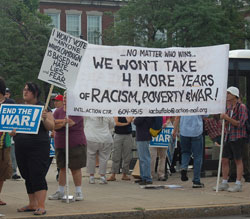
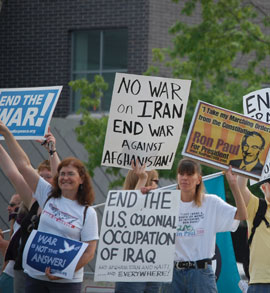
![]()

![]()
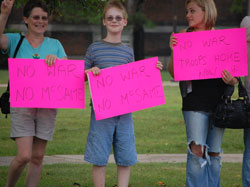
![]()
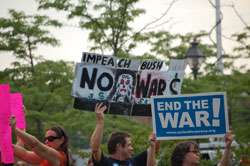
![]()
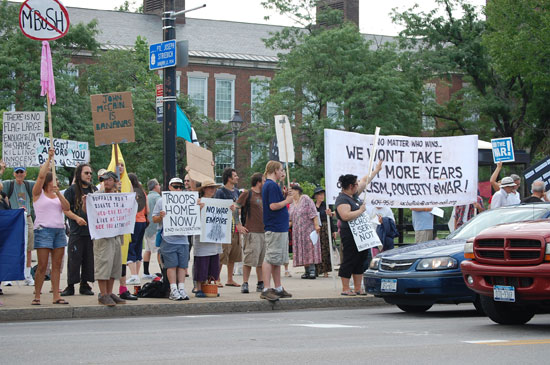
Numerous organizations and activists in Buffalo, New York, came together to organize a militant demonstration July 21 at the Albright Knox Art Gallery, denouncing Senator John McSame. The protest confronted Republican presidential candidate John McCain, making a fundraising visit to the city. More than 200 people came out, all chanting, singing and demanding End Wars in Iraq and Afghanistan Now! No War on Iran! Wave after wave of cars honked in support. Demonstrators firmly represented Buffalo’s anti-war stand — we will not support aggression, in Iraq, Afghanistan, Palestine, or Iran. People young and old, experienced activists and youth joining for the first time, those fighting for workers’ rights, student rights, political, religious and peace groups — all lined Elmwood Avenue and said No Wars! No McSame! People demonstrated for well more than an hour while awaiting to boo and denounce McSame. Then they stayed for two more hours to let him know at his departure that Buffalo says No! to aggresive war. All U.S. Troops Home Now!
The youth shined at the moment of McSame’s arrival, invigorating and sustaining the chorus of boos and chants: End the Wars Now! No to McSame! McSame Go Home! The youth made up about half the protestors and repeatedly expressed their anger and rejection of a system that keeps them impoverished and offers them only military service in illegal wars. Youth adamantly refused serving in aggressive wars and repeatedly voiced their determination to win change that favors the people.
For about three hours, demonstrators kept up a vigorous protest, with loud chants of resistance and songs that uplifted the spirits of fellow demonstrators and informed people walking past the rally. U.S. wars are terrorism! We say No! One, We Are the People, Two, A little bit Louder, Three, We Want Iraq War Ended Now! was heard from blocks away. Positioned at a stop light, the protestors succeeded in having motorists and bus drivers honk, give raised-fist salutes, and take leaflets. Using the bullhorn, youth also provided information to assist people in learning about McSame and the importance of rejecting the U.S. path of aggression. No to Imperialism! No to torture! called the youth.
McCain came to Buffalo, and in the fashion of Republicans and Democrats alike, used it as an ATM machine. He did not speak with the public or the media and instead organized to raise $1 million in a short few hours visit. Protestors made clear that Buffalo’s Republican elite did not represent the city. Protestershad earlier also organized actions at the home of a Republican fundraiser, where the minimum cost to participate was $10,000. Showing their disdain for the politics of the rich, Buffalo’s elite were also booed as they arrived at the Albright Knox, where costs were $1000-$5000 a plate. While there was a sizeable police presence, the police stayed away from verbal and physical altercations with the demonstrators. At one moment while the protesters were singing the anti-war song (see below) several police were seen clapping their hands and swaying back in forth.
By emphasizing their stand of No to McSame, demonstrators made clear the absurdity of reelecting George Bush through John McSame. Others brought out that they are on alert for the Democrats to also implement McSame and the need for the people themselves to organize based on their agenda of rejecting aggressive war and defending rights. Homeland Security, turn your weapons around! expressed the rejection of the government repression. End the Occupations from Iraq to Palestine! was among the many chants that echoed throughout the crowd and expressed the common stand with the world’s peoples.One Humanity! One Struggle! expressed the feelings of all. The chanting, singing, beating of drums, red flags, Iraqi and Palestinian flags, all gave the protest its feel of militancy and defiance.
Passers-by and motorists cheered, honked and made clear that the demonstrators represented the city and its firm stand: End the Iraq and Afghanistan Wars Now! No War on Iran! No to McSame!
[TOP]
McSame Was Not Main News —
The Anti-War Action Was
A review of the monopoly media coverage of the successful anti-war demonstration in Buffalo, New York, July 21, shows the orientation of the monopoly media to favor the rich and misrepresent the people and their fight for change. Organizers of the event informed the media, provided press releases, were available for interviews. At the action, the media was present and had ample opportunity to represent the action, particularly its significance as representing the stand of the city against war. Instead, the reports all gave emphasis to Senator John McCain — arriving on his plane, waving from his car, etc. Not a single headline was about the demonstration, even though it is a fact that it was more significant to the people of Buffalo than McCain’s fundraisers.
The action represented the people, played an important role in strengthening unity in action among a broad variety of participants, and inspired everyone to step up the work to End the Wars in Iraq and Afghanistan Now! These are all important facts and important accomplishments for the people as we fight together for change that favors the people and thus all of society. The struggle to oppose unjust wars is one of the most important, in Buffalo, nationwide and worldwide. How the anti-war movement is developing, successes it schieves, problem it faces, are all news — yet the monopoly media imposes a wal of silence, or at best, brief glimpses of an action, as occurred in this case.
It is because the protest favors the people and has significance that the media belittles it and misrepresents it as insignificant. In this particular case, it was very difficult for them to completely ignore — which is often the case when it comes to demonstrations. So there were a few lines in the press, maybe a minute on one TV station, less on others, with some segments of his visit having no coverage of the action. The large bulk of reporting focused on McCain. No explanation was given as to what makes a fundraiser by McCain more significant than the anti-war movement of the people — it is simply accepted as a given and reporting proceeds from there.
The fact is a significant demonstration was successfully organized to oppose McSame and demand an end to the wars in Iraq and Afghanistan now and no war on Iran. Certainly, as an action representing the people of Buffalo, as an action where broad mobilization was carried out all over the city, it is news of importance to the people. Nowhere was the organizing work and demonstrationgiven the weight its significance actually had.
In addition, the media itself did not denounce the fact that McCain did not speak with them while here — meaning his time was too important to even provide a brief press conference. Most mentioned this fact, but none denounced McCain for it. Why then so much publicity? It is designed to disinform the public. McSame, his using Buffalo as an ATM, is made important. The difficult work of planning, broad political mobilization, banner making and leafleting, organizing together and uniting for the successful action, is made unimportant. The views and analysis of anti-war organizers has almost no place, while McSame waving from a car window does.
The orientation toward what represents news for the people is a significant one. The disinformation of the monopoly media is used to impose notions of what is and is not important and who is and is not important. The choices made are not mistakes of the media — they reflect its role in disinforming the public so as to block their fight for progress. As one example, having coverage in the monopoly media is imposed on the movement as a measure of success, and then used against the movement. The event is not successful if it does not get coverage, and the broad audiance of the monopoly media is not informed as to its significance, and often even its existence. All of this is used to discourage and discredit the anti-war movement, at a time when it is strengthening its unity in action and growing better organized and conscious of its responsibilities. This was seen at the action, with the firm stand not only on Iraq, but Afghanistan and Iran as well, and the broad participation, including many youth.
More generally, when it comes to the elections, all the focus is on the candidates and their every move. And it is almost entirely limited to the candidates of the Democrats and Republicans. For president, for example, the Green Party had its national convention in Chicago July 10-12, selecting their candidates: Cynthia McKinney for president and Rosa Clemente for vice-president. Both women, one an African American, the other a black Puerto Rican. How is this not news? The Green Party convention and candidates were essentially ignored, especially outside of Chicago. A google search turns up Green Party materials from their website and little else. Why? Who decides that their convention and candidates are not news, while McSame’s visit to Buffalo is? He did not campaign, did not even hold brief meetings with the people of Buffalo. He held two dinners costing a minimum of $1,000 at one and $10,000 at the other. He did raise more than $1 million, which people of the city think would be much better spent in Buffalo. The literally hundreds of millions being spent on the elections are a scandal given the grave crisis facing cities like Buffalo, which has the second highest poverty level nationwide. But the monopoly media remains silent on these matters, diverting attention from actual news and disinforming the public about significant events in the life of the poeple and their struggle for progress.
As another example, there is no examination of how and why the current set up marginalizes the people from decision-making. McSame and Barack Obama are both willing to “consult” with the people. But when it comes to deciding the program and policies, deciding to end the wars now, deciding to change the direction of the economy so it serves the needs of the peoples, there is no place for the people and their agenda. When it comes to equal time for all candidates and for the broad movements organizing for change, there is no place. These facts show the damage of disinformation by the monopoly media.
The experience of demonstrators in Buffalo, like elsewhere, again emphasized the importance of building and developing our own media that can be counted on to provide people with news and analysis of significance to them and their social movements. Voice of Revolution will continue to strengthen its role in contributing to building such media and contributing to the fight for change that favors the people. We welcome your support.[TOP]
(Call and response for each line) Chorus: This is a rich man’s war This is a rich man’s war First Verse: Mothers and fathers are crying
|
Why don’t you send them back home? Chorus (two times) second verse: Weapons of mass destruction Homeland Security Chorus (three times) |
[TOP]
July Actions Demand No War on Iran
We reprint below some of the numerous rallies, street theater, teach-ins and more organized across the U.S. in July demanding No War on Iran! and denouncing Congress for its crime of promoting aggressive war. Actions also called to End the Wars Against Iraq and Afghanistan Now! Showing the determination of the movement to block war on Iran, yet more actions in more than 60 cities nationwide are planned for August 2.
New Hampshire
Keene:
• Iran Resolution Outreach to Congressional Delegation, NH District 2
Monday, July 21, 2008 • 11:30am
Express your opposition to military action against Iran. Sign a petition addressed to the U.S. Secretary of State and Congressional leaders. Sign postcards to Representative Hodes and Senator Sununu urging the removal of their names from sponsorship of H.R. Con 362 and SR 580, and to vote ‘NO’ when those resolutions come up for vote in the U.S. Congress.
• Dialogue, Not Bombs: No War on Iran
Monday, July 21, 2008 4:30 pm
Visibility demonstration aimed at the general public which has been bombarded in the mainstream media with provocative and bellicose language toward Iran. Help us plant the words “dialogue” and “diplomacy” and “Take military options off the table” in the minds of commuters as they wait at the traffic lights on their way home from work. The intersection has great visibility to passersby.
Massachusetts
Arlington:
• Emergency Action: No Attack on Iran!
Saturday, July 19, 2008 • 10am
Tisbury:
• No War on Iran Rally
Sunday, July 20, 2008 • 1pm
New York
Brooklyn:
• Hands Off Iran! Peace Voter Registration Mobilization!
Saturday, July 19, 2008 10am, Grand Army Plaza
Reach out to Brooklyn residents with flyers that urge people to pressure candidates on the issues of war and peace. Brooklynpeace.org
New York City:
• Phone-A-Thon
Friday, July 18, 2008 • Noon
We are sure most New Yorkers do not want the U.S. to attack Iran and would be disgusted to know that many NYC Representatives co-sponsored HR 362.. Help flood the phone lines as we ask passersby to call Congress on the spot using our cell phones. Give out flyers and discuss the issue. Help people raise their voices.
• Petitioning/Peace Voter Registration
Saturday, July 19th 2008 noon
Tabling to register voters with a peace message and also petitioning presidential candidates to end the wars.
• Hands off Iran/Voter Registration
Sunday, July 20, 2008 1pm
Tabling around New York City with information on Iran, to register voters and petition presidential candidates to end the wars.
• Stop War On Iran
Saturday, August 2, 2008 • noon
National Mobilization in 50+ U.S. Cities. Rally and March, Times Square, 43rd St & Broadway at Noon
New Jersey
Trenton:
• Emergency Demonstration Against War on Iran
Monday, July 21st 2008 • 12 noon at the State House
Emergency Demonstration against US build-up toward War with Iran. The State House has 30 major media outlets from throughout the region, so this is a very important place to get our message out.
Pennsylvania
Philadelphia:
• No War on Iran Vigil
Wednesday, July 23, 2008 • 4:30pm
No War on Iran - Another War Must be Prevented! Vigil for Peace at the Federal Building, with banners, signs, and leaflets.
Wayne:
• Stop War on Iran
Sunday, August 3, 2008 5:30pm
Interfaith Peace Meal and unveiling of 1000 origami paper cranes commemorating Hiroshima/Nagasaki Week, Central Baptist Church (CBC), sponsored by CBC Peacemakers Mission Group
• Peace Vigil
Sunday, August 3, 2008, 6:30-7:30pm
Sponsored by Main Line Unitarian Peace and Justice Committee, Bryn Mawr Peace Coalition and Main Line Citizens for Impeachment
Delaware
Wilmington:
• Talks, not Bombs
Saturday, July 19, 2008 • 11am
A vigil to demand talks with Iran, not bombs, barricades, sanctions.
Washington, DC
• Peace Action Lobby Day
Monday, July 21, 2008 • 9am
Join Peace Action members and friends in Washington DC to lobby Congress about No War on Iran, Ending the war in Iraq, and U.S. nuclear disarmament.
• Protest Christians United for Israel Conference
Monday, July 21, 2008 • 5pm
Christians United for Israel, founded and led by Pastor John Hagee — of “Hitler was a hunter” fame — has been a key advocate of military confrontation between the U.S. and Iran. Senator Lieberman and American Israel Public Affairs Committee (AIPAC) officials will be at the conference.
• No War on Iran
Saturday, August 2, 2008 • 3pm
An Emergency Call to Action: Stop the War on Iran
Virginia
Charlottesville:
• Forum on Alternatives to Attacking Iran
Monday, July 21, 2008 • 7 pm
A free public forum on alternatives to attacking Iran, featuring remarks by Carah Ong and Helena Cobban.
North Carolina
Charlotte:
• Demonstration to Stop War on Iran & Protest Gas Prices
Saturday, August 2, 2008 • 1pm
Join us in Charlotte, NC as part of the day of worldwide actions to Stop War On Iran (see http://www.StopWarOnIran.org).
Florida
Melbourne:
• Stop War On Iran - Troops Out Of Iraq
Wednesday, August 6, 2008 • 6pm
In solidarity with National events Brevard Patriots For Peace will join an Emergency Call to Action. Stop War on IRAN, Troops Out of IRAQ
• March to Prevent War with Iran
Saturday, August 30th 2008 • 2pm
Tallahassee:
• No Iran War
Sunday, July 20, 2008 • 12:30pm
Streetside informational picket
Ohio
Cleveland:
• Iran Call to Action
Monday, July 21, 2008
Volunteers will distribute flyers at key sites from July 18 to 21. Flyers provide background information and call on citizens to contact area representatives to oppose dangerous new sanctions on Iran and support unconditional negotiations.
Columbus:
• Peace Boat Blockade
Monday, July 21, 2008
On July 21, Central Ohio residents will gather and march to Representative Tiberi’s office as a sign of opposition to his support of a blockade on Iran.
Michigan
Ferndale:
• No blockade or attack on Iran
Monday, July 21, 2008 4:45pm
Every Monday there are anti-war protests at 9 Mile and Woodward
Illinois
Champaign:
• Anti-War Demonstration, Country Fair, Champaign
Saturday, July 19, 2008 • 2pm
Anti-war demonstration at Country Fair shopping center. Bring a sign or carry one of ours.
Chicago:
• No war on Iran! “Freeze-In” in Millennium Park
Monday, July 21, 2008 • 5:45pm
Modeled on the Freeze in Grand Central last anniversary. At a signal, volunteers in No War on Iran t-shirts will freeze in whatever posture they are at while wading in Chicago’s Crown Fountain in Millennium Park, a public magnet. Others will leaflet against a new war and in support of the No War On Iran Resolution coming before the Chicago City Council about a week later.
• No Attack on Iran!
Saturday, August 2, 2008 12 noon
Join us as Chicago joins 50+ other cities in a day of protest against a U.S. or Israeli attack on Iran.
Wisconsin
Milwaukee:
• No War on Iran/Iraq Moratorium
Friday, July 18, 2008 5pm
Our successful, monthly Iraq Moratorium will focus its messaging on “No War on Iran” as it gathers and marches in the busiest intersection in downtown Milwaukee. Vets for Peace are making signs and Milwaukee Progressive Students are making banners.
• No War on Iran Congressional Office Lobby March
Monday, July 21st 2008 • 10am
Coalition peace activists will lobby at three congressional offices, meeting with home staff to discuss the national call and relevant legislation. Bringing attention to the issue, they will march with signs, banners and flags between the home offices of Sen. Herb Kohl (D), Congresswoman Gwen Moore (D), and Sen. Russ Feingold (D).
Iowa
Waterloo:
• No War in Iran
Saturday, July 19, 2008 • 11am-noon
Every third Saturday of the month at the intersection of Kimball and Ridgway in Waterloo.
Waterloo-Cedar Valley United for Peace & Justice will be doubling its monthly peace efforts as military attack on Iran remains high on the Bush Administration agenda.
Missouri
Kansas City:
• No War On Iran
Weekly Vigil Every Sunday • 4pm at 47 and Main
Tennessee
Nashville:
• Do Not Bomb Iran
Friday, July 18, 2008 • 4:30pm
Demonstration: Iraqis Want Us Out, Bring the Troops Home!
Texas
San Antonio:
• Peace Demonstration Against War In Iran
Monday, July 21, 2008 • 12pm, Bring signs!
Nevada
Reno:
• Not Another War!
Friday, July 18, 2008 12noon
Protest in front of the Thompson Federal Building Opposing HR362. Bring signs!
Oregon
Portland:
• Do Not Attack Iran
Friday, August 1, 2008 • 5 PM
Rally to coincide with national actions and Portland’s Ninth Annual Iranian Festival
California
Sacramento:
• Hands Off Iran! End U.S. Occupation of Iraq & Afghanistan!
Saturday, July 26, 2008 • 5pm
Demonstration! Bring your signs, friends, family! 16th & Broadway
Contact: 916-448-7157, sacpeace@dcn.org
San Francisco:
• Do Not Attack Iran!
Saturday, July 19, 2008 • 4pm
As the Bush administration maneuvers to bomb Iran, Congress has been a willing enabler of the administration’s crimes of aggression. Congress and Speaker Pelosi have the ability to stop the administration’s war plans. They can pass a resolution requiring congressional approval for any future military action. Alternatively, they can begin impeachment hearings that would occupy administration officials.
San Jose:
• Do Not Attack Iran
Friday, July 18th 2008 • 5pm
Speak out to counter the renewed threats of U.S./Israeli military action. Vigil is at 2nd and San Carlos entrance to Federal Building.
[TOP]
Iran’s provocative missile tests ten days ago again fueled the debate on the likelihood of aerial strikes against Iran. Since last week’s thaw, however, an attack on Iran by the end of President Bush’s tenure no longer appears in the offing. Moreover, the narrow, exclusively military focus of the debate misses the broader picture. The overall U.S. strategy of containing Iran has failed in principle. And the attempt to impose a sanctions regime on Iran has led to an erosion of U.S. strategic influence in Asia and the Middle East. Over the long term, Washington’s shortsighted containment policy will only hurt Western business in the region. It will also play into the hands of China, drive crucial allies away, and render Iran untouchable.
At the eleventh hour, even the Bush administration seems to have realized, albeit in a limited way, the inherent failure of the containment approach. In an important about-face, the White House not only agreed to direct talks between U.S. and Iranian officials in Geneva this weekend but also held out the prospect of soon opening an American interest section in Tehran. This sea change suggests that the realists around Secretary of State Condoleezza Rice and Secretary of Defense Robert Gates having finally gained the upper hand over the faction around Vice President Dick Cheney in the intra-administration feud. The reversal also acknowledges that the dual approach of sanctions and military threats have produced nothing but America’s own isolation. The far-reaching repercussions of these counterproductive sanctions against Iran and America’s increasing isolation in Asia are best illustrated by this month’s breakthrough on the Iran-Pakistan-India pipeline.
The Iran-Pakistan-India pipeline (IPI) is a $7.5 billion project designed to supply Indian mega-cities with natural gas from Iran’s Persian Gulf fields via a 1,700 miles long pipeline across Pakistan. The project has been repudiated and boycotted by one project partner or the other uncounted times since its conceptualization. But on July 3, Indian Oil Minister Murli Deora affirmed on the sidelines of the World Petroleum Congress in Madrid that India expects to finally sign the deal next month. This long-time-in-coming breakthrough constitutes a crucial step toward energy security for India.
For the United States, on the other hand, it deals a resounding blow to the fragile international sanctions front the Bush administration has crafted to contain Iran. What is more, with China keen on joining the project, a new geo-strategic axis — Tehran-Islamabad-New Delhi-Beijing — is about to emerge. This axis will radically reshuffle the power structure in Asia and, with it, the global balance of power.
Despite the Cheney faction’s saber-rattling, the Bush administration has banked on economic sanctions strangling investment and beating a technology-dependant Tehran into submission. This strategy of tightening the economic corset choking Iran and thus forcing it to renounce its nuclear ambitions, however, has isolated the United States and its allies more than Iran. For the time being, Washington has succeeded in cajoling French Total SA, Anglo-Dutch Shell, and Spanish Repsol to withdraw their bids to exploit the Iranian South Pars field, the world’s largest gas field, and the EU approved freezing the assets of a major state-owned Iranian retail bank, Bank Melli, last month.
But Iran’s countermeasures have been in the works for quite a while. After all, the country has long suffered from the effects of sanctions and the reluctance of Western companies to invest in its energy sector. So it has increasingly looked eastward for new financiers and partners. The most striking example is Iran’s March 24 bid for membership in the Shanghai Cooperation Organization (SCO), the Central Asian security group dominated by Russia and China.
This new “looking east” (negahe be shargh) policy concept is the brainchild of Bangalore-educated, Iranian Foreign Minister Manouchehr Mottaki. While an Iranian SCO membership is still in the future, Asian dominance over the Iranian market is a current reality. China already ranks as the number one foreign investor in Iran. Malaysian Petronas and LG Korea feature prominently in the exploitation of South Pars. The new IPI would be a final nail in the coffin of the sanctions regime.
The Empire Strikes Back
The United States has fought hard against the new pipeline linking Iran, India, and Pakistan. As recently as July 15, Senators Christopher Dodd (D-CT) and Richard Shelby (R-AL) threatened to strengthen the Iran and Libya Sanctions Act of 1996 that allows for the litigation of foreign firms investing in sanctionable business in Iran — a clear warning signal to India. Meanwhile, since the three countries could not bear the projected costs of $7.5 billion on their own, Washington has also used its considerable influence at the World Bank in the person of former president Paul Wolfowitz. He bluntly informed Pakistan that the bank would not allow any international institution to finance the project.
In its attempts to destabilize Iran and disrupt the possible route of the pipeline, the United States is allegedly supporting Jundallah. This militant insurgency in the Iranian Sistan and Baluchistan Province, has suspected links to the Taliban and the Baloch Liberation Army (BLA), which has been fighting a guerilla war against the Pakistani army since 2000. This clandestine Baloch connection, recently exposed by Seymour Hersh in The New Yorker, undermines America’s fragile, always-on-the-brink-of-a-coup ally, Pakistan. Washington is also pushing for the alternative of a Turkmenistan-Afghanistan-Pakistan-India pipeline (TAPI), the construction bids for which, as a side benefit, would go to U.S. companies. This alternative scheme is strikingly similar to the pipeline deal Unocal struck with the Taliban in 1996.
U.S. obstruction is not the only -prob lem facing the IPI project. Iran is asking for a lot of money; India and Pakistan have notorious difficulties cooperating. But this cluster of American threats and coercions proved until recently to be pivotal in preventing the project from getting off the ground. Former Undersecretary of State Nicholas Burns cited preventing IPI as one of his greatest accomplishments at a conference at Harvard University in March.
Push Factors
India, however, desperately needs energy for its growing economy. And it will risk its relationship with the United States to get this energy. Moreover, its heavily subsidized low gas prices are no longer sustainable, especially now before an election year. After all, with oil around $140 per barrel and a global recession looming on the horizon, the United States no longer has the ability to pressure countries to sever energy ties with Iran, as it did when a fire- breathing John Bolton forced Japan to withdraw its bid to exploit the Iranian Azadegan oil field. It is now every country for itself in the new energy environment.
Despite U.S. opposition, then, the IPI pipeline is back on line. The last commercial difficulties between Pakistan and India concerning transit fees have been cleared away, and only minor technical details remain for a trilateral meeting in Tehran scheduled for the coming weeks. If an agreement is reached this summer, construction could commence in 2009 and be completed by 2012. Pakistan is eager to expand its new role as the energy corridor of the future. It expects an annual $600 million in transportation fees from IPI and is vigorously politicking for China to join the project in order to increase those revenues. Until Indian consent was secured, Pakistan used the Chinese wild card as a bargaining tool to force a wavering India’s hand. But now it seems that Islamabad and Tehran can have it both ways. If World Bank financing is off the table, China can step in to foot the bill.
Finalization of IPI in the coming weeks would be more than a slap in the face for President Bush. After all, in 2006 he personally fought for a nuclear cooperation pact with India designed to meet India’s energy needs while tying it closer to the United States as a counterweight against a rising China. Now however, not only has the Indian government so far failed to get the pact ratified in the Indian parliament, but India is about to collaborate with China in undermining America’s sanctions on Iran. Pakistan, beefed up with more than $10 billion in military aid by the Bush administration, is also giving the cold shoulder to Washington. And Iran, soon to be the number one energy supplier for East Asia, becomes more untouchable by the day.
The Bush administration’s lofty design to keep Iran in the box and use the Indian tiger to tame the Chinese dragon runs the risk of collapsing in the last months of his presidency. In fact, the American sanctions regime is driving Iran into China’s arms and facilitating a Sino-Indian rapprochement. Even worse, America is facing the rise of a new strategic axis in Asia that stretches from Tehran to New Delhi to Beijing, with Islamabad as a central hub, and financed by petrodollars. Then again, the Bush policy, by giving a lift to this new strategic energy alliance, may ultimately strengthen support in Washington for a military strike against Iran: to accomplish what containment failed to do.
Hannes Artens is the author of The Writing on the Wall, a political novel cautioning against war with Iran.
[TOP]
By now the structure of the U.S. game with Iran is clear. In the first move, the United States and Iran make some small progress toward improved relations. In the counter move, hardliners in the United States and Israel launch attacks against Iran in order to sabotage these improving relations.
In the latest iteration of this game, the U.S. State Department has made an interesting gambit. It announced that Undersecretary of State William Burns would sit at the table on July 20 as members of the European Union entered into talks with Iran over its nuclear program. At the same time, the United States has been reported to be considering opening a formal American Interests Section in Tehran. These two actions will be the first serious public diplomatic activities between the two nations in nearly three decades. (Three earlier meetings in Baghdad between U.S. Iraqi Envoy Ryan Crocker and Iranian Ambassador to Iraq Hassan Kazemi-Qomi focused on security in Iraq).
The counter-moves came fast and furious. First, former UN ambassador and prominent neoconservative John Bolton launched a jeremiad against the U.S. government on July 15 in the Wall Street Journal. Criticizing the administration for failing to act militarily against Iran, Bolton placed his hopes on Israel to carry out the military attack that he fervently desires. “Instead of debating how much longer to continue five years of failed diplomacy, we should be intensively considering what cooperation the U.S. will extend to Israel before, during and after a strike on Iran,” he wrote.
Following closely on Bolton’s editorial, The New York Times printed another attack against Iran on Friday, July 18, just one day before the opening of the European talks, by Benny Morris, an historian at Ben-Gurion University. Like Bolton, Morris presents an Iranian nuclear weapons program as an established fact, implies that Iran would make a first-strike attack on Israel, and thus justifies pre-emptive military action on Israel’s part.
Both Bolton and Morris base their attacks on false premises. Diplomatic dealings with Iran have, in fact, succeeded on the few occasions they have been tried. There is no proof anywhere that Iran actually has a nuclear weapons program at present, a fact underscored by the National Intelligence Estimate of December 2007. In fact, Iran’s nuclear experiments are still at a primitive level, far from any possibility of manufacturing weapons. Iran has never directly threatened Israel and is not likely considering a first strike against Israel.
Such attacks have followed every minuscule improvement in U.S.-Iranian relations during the Bush administration. Every first move in a warming trend — such as Iranian support for the U.S. war against the Taliban in Afghanistan, U.S. aid to Iran during the Bam earthquake in 2003, and Iran’s formal offer to enter into comprehensive negotiations with the United States in 2003 — has been followed by sharp criticism from both inside and outside of the Brush administration. Detractors have countered these advances with accusations of Iranian support for Hezbullah and Hamas, and support for “special groups” attacking U.S. forces in Iraq. True to form, the U.S. military announced the launching of a new crackdown on weapons smuggling from Iran to coincide with the Saturday talks.
None of these accusations, along with the Iranian weapons program and plot to launch a first-strike against Israel, has ever been proven. The most memorable of these attacks was the labeling of Iran as part of the “Axis of Evil” in President George Bush’s 2002 State of the Union Address, just as Iran’s military aid to the United States was beginning to create a climate of trust between the two nations.
Bolton, Morris, and their ilk may represent the last, weak gasp of the hawks who would embroil the United States and Israel in a disastrous confrontation with Iran. Indeed, for the time being, it seems that cooler heads are prevailing. Though Western commentators described the talks at the one-shot Saturday meeting negatively as a “deadlock,” William Burns’ official presence at the table was an important benchmark. Iran did not accept the Western proposals on the spot, but was given two weeks to respond. The Iranians appeared pleased. Saeed Jalili, Iran’s chief negotiator, called the negotiating process a “very beautiful endeavor.”
Despite this progress, the power of the American and Israeli extremists should not be underestimated. They still have the ear of Vice President Dick Cheney and a dwindling coterie of his supporters in the Department of Defense. A group of Israeli politicians, including Israeli Defense Minister Ehud Barak and Israeli Defense Force Chief of Staff Gaby Ashkenazi, have arrived in Washington, according to Mother Jones magazine, presumably to convince the Bush administration to allow them to carry out their attack.
Hostile rhetoric against Iran also plays into the U.S. electoral process. For American politicians, Iran is a universal bogeyman, useful in an election year as a device to show elected officials as tough on foreign miscreants. Indeed, since the Iranian Revolution U.S.- Iranian relations have been a centerpiece in election debates. Conspiracy theorists believe fervently that the Republican Party engineered an “October Surprise” in 1980 with Iranian officials — delaying the release of the American Hostages until after the U.S. Presidential election — and thus denied Jimmy Carter a second term. The purported event, true or not, has supplied a permanent -political term for American elections.
In every presidential election since, U.S.-Iranian relations have been featured in presidential debates and campaign ads, with universal negativity toward Iran. This year is no exception with Barack Obama, Hillary Clinton, and John McCain all expressing hostile attitudes toward Iran. And this year’s October Surprise is the rumor that the Bush administration will bomb Iran just before the election to give a boost to John McCain. Unless the Israeli hawks get there first.
William O. Beeman is professor and chair of the department of anthropology at the University of Minnesota, Minneapolis. He is president of the Middle East Section of the American Anthropological Association.(Reprinted from Foreign Polcy in Focus.)
[TOP]
